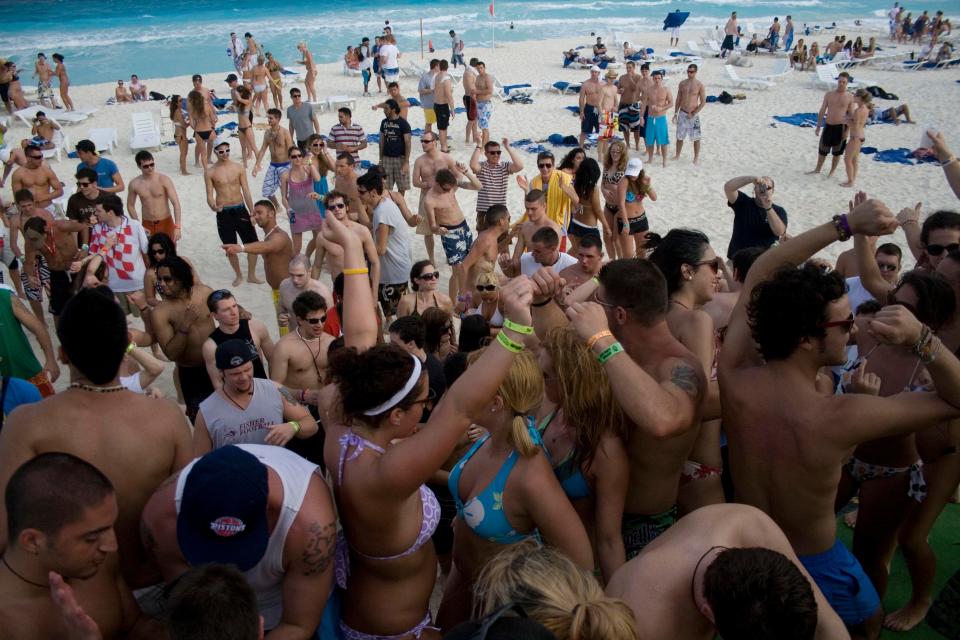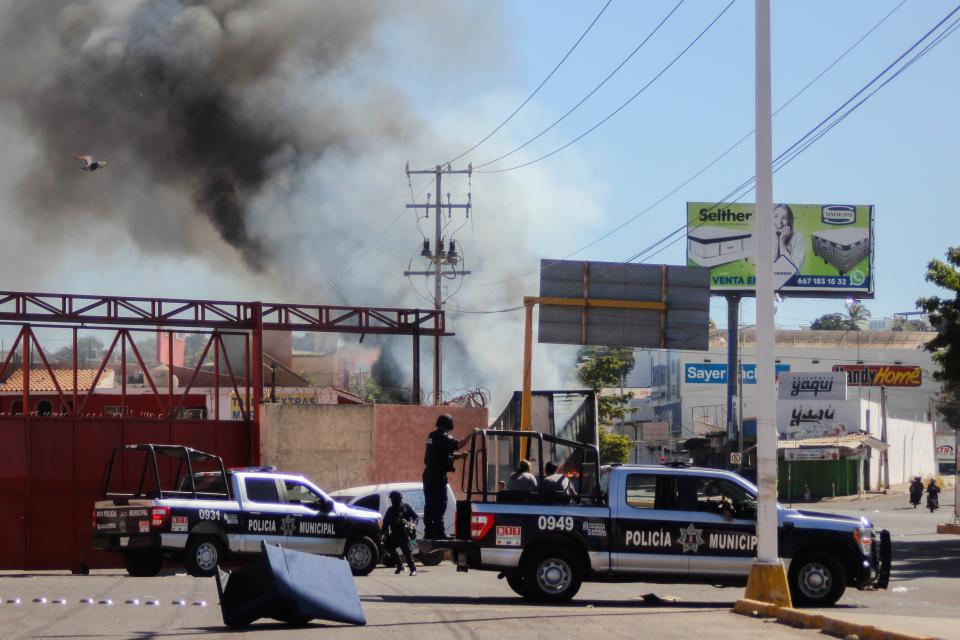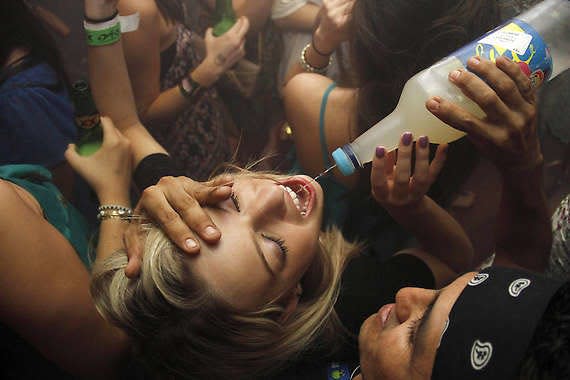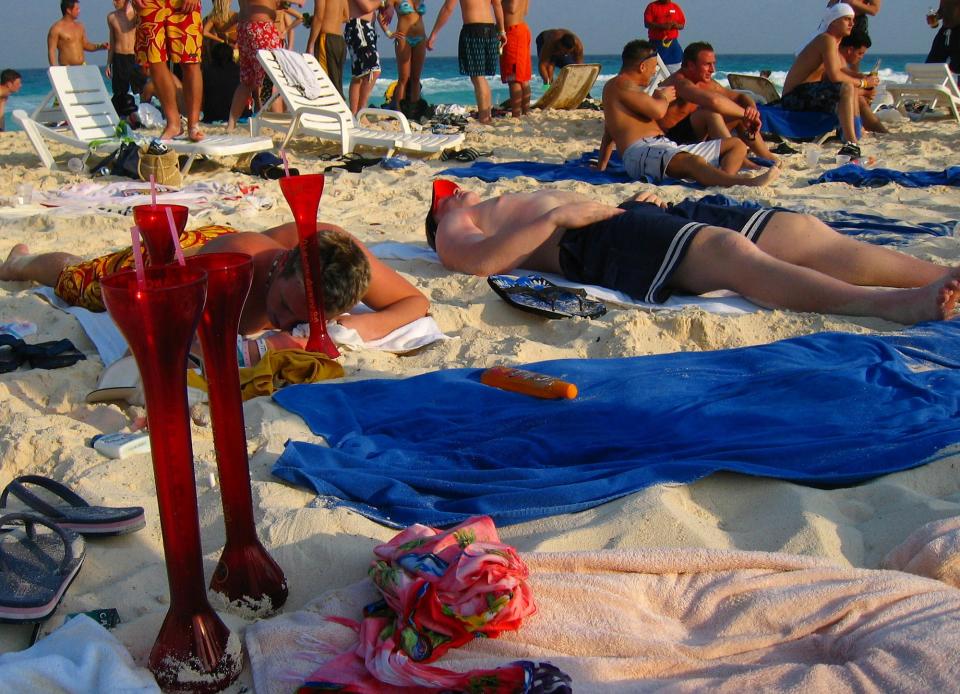Heading to Mexico for spring break? Here's what you should know about cartel violence
MEXICO CITY – Spring break season is upon us, and Mexico is again a top destination for American college students looking to cut loose at the beach.
According to AAA, more Americans are heading out of the country for spring break this year. “Booking data shows international travel this season is up 30% over 2022,” the association reported.
Cancún, with its turquoise waters and vibrant nightlife, is one of the top destinations for those travelers, AAA reported.
But what about all the headlines about drug cartels south of the border, particularly the most recent violence carried out on a group of Americans who crossed the border at Matamoros for a medical procedure?
Is it safe to travel to Mexico?
It’s a legitimate question for students and parents alike.

The truth is, Mexico is a big country — it would take about 30 hours to drive from Matamoros to Cancún — and news about cartel violence tends to overshadow the vast amount of everyday happenings regarding the economy, trade and tourism.
“It’s important to recognize that although the levels of violence in Mexico are very high, foreign travelers, in general, just haven't really been prime targets, so the general risk, I think it’s relatively low,” said Ev Meade, director of Proceso Pacifico, a peace-building organization based in Mexico.
The kidnapping deaths in Matamoros are thought to have been the result of a case of mistaken identity, for instance. Factions of the Gulf Cartel are vying for territory in the area, and one of those splinter groups — the Scorpions — later apologized for the attack and turned over members of their group to the authorities. They are now in custody.
Still, this latest incident led the Texas Department of Public Safety to urge against spring break travel to Mexico.
"Based on the volatile nature of cartel activity and the violence we are seeing there, we are urging individuals to avoid travel to Mexico at this time," the DPS director said in a statement on Friday.
More:Mexican cartel apologizes for kidnapping of Americans, turns over 5 men it claims were responsible
In 2022, more than 20 million international tourists traveled to Mexico by air, with most landing in Cancún or Mexico City. More than 60% of those travelers were Americans.
“The vast majority of tourists who visited the Mexican Caribbean returned very happily,” Bernardo Cueto, Quintana Roo’s secretary of tourism, told The Courier Journal.
Cancún is in the Mexican state of Quintana Roo.
“In 2022, we presented very few high-impact incidents of tourists. It’s worth adding that work is being done to guarantee the safety of our population and visitors and also to keep organized crime gangs away from our main destinations,” Cueto said.
“Mexico is very large and diverse, and the levels of violence are very heterogeneous,” security analyst Alejandro Hope said. “Tourist areas, with some exceptions, have some insecurity problems, but that insecurity usually does not directly affect tourists.”
Scott Stewart, vice president of Torch-Stone Global, a U.S.-based security firm, said the threat isn't always just coming from Mexican criminals or Mexican citizens.
“Americans themselves can behave badly when they're intoxicated or high. So, you know, you need to be careful of all those sorts of threats.”
Is it safe in Mexico? Violence is undeniable

Even though most tourists end up with an enjoyable experience in Mexico, violence in the country can't be denied.
Shootouts in the street, local officials assassinated, cities under siege following high profile arrests — it’s all been in the news recently.
“It’s worth noting that though the homicide rate went down slightly, violence is not in any way, shape, or form under control in Mexico,” Meade said.
“I think that the people who want to say, you know, all is good, everything's great -- well, the data just doesn't support that.”
Mexico’s homicide rate is historically high, topping out at a rate of 29 intentional killings per 100,000 people in 2019, and falling to 28 in 2020, according to numbers from the World Bank.
More:Ignoring cartel danger, Mexican families scour wilderness for missing loved ones' remains
The U.S. State Department recommends avoiding travel to six Mexican states: Colima, Guerrero, Michoacán, Sinaloa, Tamaulipas and Zacatecas.
Only two states in Mexico, Yucatán and Campeche, have an “Exercise Normal Precautions” advisory.
The most visited states by Americans, including Quintana Roo and the state that is made up of Mexico City, are under “Exercise Increased Caution” alerts from the U.S. government.
Meade said the difference between violence in Mexico and some cities in the U.S. is impunity.
“… In Mexico, more than 90% of homicide rates don't ever produce an arrest,” he said. That number stood at about 50% as of 2020 in the U.S.
Still, experts agree tourists are not the preferred target.
“Most tourists will never meet the cartels. In other words, violence is often generic. The violence tourists face is much more local,” Hope said.
More:That Super Bowl guacamole you're eating probably had a risky trip through cartel territory
Cutting loose in Mexico can get you into trouble

While some spring breakers are looking to party in a place with fewer restrictions, Mexican laws, in many cases, are similar or stricter than in the U.S.
And ignorance of the law is not a defense.
“Indeed, many tourists arrive at our destinations looking for illegal substances. We have created campaigns to warn against the illegality of consumption and purchase,” Cueto, the Quintana Roo tourism secretary, said.
Local drug markets are controlled by small criminal gangs that work for the big drug cartels, and violence in Mexico is mainly fueled by that market.
“You can get in trouble if you purchase drugs from those dealers. Dealers are not your friends...,” Cueto said.
More:Ignoring cartel danger, Mexican families scour wilderness for missing loved ones' remains
Travelers who go to areas outside the tourist zones to look for drugs can run into serious problems, Stewart said.
“Parents should be worried, especially if the kids are going into marginal areas to purchase or use drugs or frequent a house of prostitution,” Stewart told The Courier Journal. “Anything that is going to bring them into close proximity to organized crime increases your threat.”
Hope, the security analyst, agreed: “Try not to come into contact with these criminal gangs ― and one of the ways (to do that) is not to become a consumer of what they sell.”
Don’t forget to pack your common sense

Regardless of the destination, experts say common sense is the key to returning home safely and with a good international travel experience.
“I think it's important for the parents and any traveler to not just look at the 10,000-foot-level view, but understand that when it comes to crime, things are very granular,” Stewart from Torch-Stone firm said.
Torch-Stone’s Stewart recommends travelers have the U.S. emergency contact number of the consulate nearest to the area you’re visiting, and also the hotel.
“A lot of times the concierge can help you if you're in a bad situation,” he said.
He recommends having a copy of your passport and credit card information, in case it is lost or stolen, and to have that information as a hard copy, just in case your phone is lost.
“Mexico is a beautiful place, there are a lot of things to do, but if you're drunk and stupid at 2 in the morning on the street, very little good is going to happen to you, and the same thing is going to happen in Chicago as could happen in Cancún,” Stewart said.
Karol Suárez is a Venezuela-born journalist based out of Mexico City. She is a contributing writer to The Courier Journal. Follow her on Twitter at @KarolSuarez_.
This article originally appeared on Louisville Courier Journal: Planning a spring break trip to Mexico? What's the latest with cartel

